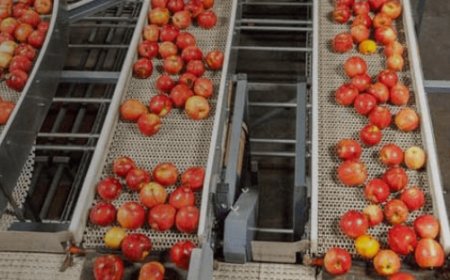How to Find Artisanal Ice Cream in Fort Worth
How to Find Artisanal Ice Cream in Fort Worth Fort Worth, Texas, is a city steeped in cowboy culture, historic architecture, and a rapidly evolving food scene. While it may not immediately come to mind as an ice cream capital, the city has quietly become a haven for artisanal ice cream makers who prioritize small-batch production, locally sourced ingredients, and bold, innovative flavors. Finding
How to Find Artisanal Ice Cream in Fort Worth
Fort Worth, Texas, is a city steeped in cowboy culture, historic architecture, and a rapidly evolving food scene. While it may not immediately come to mind as an ice cream capital, the city has quietly become a haven for artisanal ice cream makers who prioritize small-batch production, locally sourced ingredients, and bold, innovative flavors. Finding authentic artisanal ice cream in Fort Worth isn’t just about locating a sweet treat—it’s about discovering a culinary movement rooted in craftsmanship, community, and creativity. Whether you’re a local resident looking to explore new flavors or a visitor seeking a memorable food experience, knowing how to identify and access true artisanal ice cream can elevate your palate and connect you with the heart of Fort Worth’s food culture.
Artisanal ice cream differs from mass-produced supermarket brands in fundamental ways. It’s made in small quantities, often by hand, using premium ingredients like organic dairy, single-origin cacao, fresh fruits from regional farms, and natural flavorings. No artificial stabilizers, emulsifiers, or high-fructose corn syrup are used. The texture is richer, the flavors more complex, and the experience more personal. Unlike chain ice cream shops that rely on standardized recipes and frozen bases, artisanal makers craft each batch with intention—sometimes even adjusting recipes seasonally based on harvests or local events.
But with dozens of ice cream shops, food trucks, and pop-ups across the Metroplex, distinguishing true artisans from imitators can be challenging. Many businesses label themselves “artisanal” for marketing purposes without adhering to the core principles of small-batch, handcrafted production. This guide will walk you through a comprehensive, step-by-step process to identify, locate, and enjoy the most authentic artisanal ice cream Fort Worth has to offer. You’ll learn how to evaluate quality, leverage local resources, recognize trustworthy makers, and even connect with the creators behind the scoops. By the end, you won’t just know where to find the best ice cream—you’ll understand what makes it special.
Step-by-Step Guide
Step 1: Understand What Makes Ice Cream “Artisanal”
Before you begin your search, it’s essential to define what qualifies as artisanal ice cream. Not all hand-scooped ice cream is artisanal. True artisanal ice cream is characterized by five key attributes:
- Small-batch production: Made in quantities of 5 gallons or less per batch, often using traditional ice cream makers rather than industrial freezers.
- High-quality, minimally processed ingredients: Organic cream, real vanilla beans, fresh fruit purées, fair-trade chocolate, and natural sweeteners like honey or maple syrup.
- No artificial additives: Absence of carrageenan, guar gum, polysorbate 80, or artificial flavors and colors.
- Seasonal and local sourcing: Ingredients are sourced from nearby farms, dairies, and producers whenever possible.
- Handcrafted process: Each step—from infusion to churning to packaging—is done with care, often by the owner or a small team.
When you see a shop advertising “handmade” or “small-batch,” ask questions. What’s the source of the cream? Are the fruits in season? Do they make their own caramel or cookie swirls in-house? Artisans are proud of their process and will gladly share details.
Step 2: Identify Neighborhoods with High Artisanal Concentration
Not all areas of Fort Worth are created equal when it comes to artisanal ice cream. Certain neighborhoods have become hubs for food innovation and independent businesses. Focus your search on these key districts:
- Fort Worth Cultural District: Home to museums, galleries, and a growing number of food-focused entrepreneurs. Several artisanal ice cream shops cluster here due to foot traffic from tourists and locals seeking unique experiences.
- Fort Worth Stockyards: While known for barbecue, this historic district has seen a rise in artisanal dessert spots that blend Southern tradition with modern technique.
- North Side on Lamar: A vibrant, walkable corridor with independent cafes, boutiques, and food trucks. This area is a hotspot for young entrepreneurs launching new dessert concepts.
- West 7th: A trendy, urban neighborhood with a strong local-first ethos. Many of Fort Worth’s most acclaimed artisanal ice cream makers operate here.
- Southside on Lamar: A rapidly developing area with a mix of established and emerging food businesses. Look for pop-ups and seasonal stalls here.
Use Google Maps to search “ice cream near me” and filter results by recent reviews and photos. Pay attention to shops with fewer than 10 locations, no franchise branding, and images showing visible ingredients or handwritten chalkboard menus.
Step 3: Visit Local Farmers Markets
One of the most reliable ways to discover artisanal ice cream makers is by visiting Fort Worth’s farmers markets. These venues attract food artisans who sell directly to consumers and often test new flavors before opening a storefront. Key markets include:
- Fort Worth Farmers Market (near the Stockyards): Held every Saturday morning, this market features local dairy farmers, honey producers, and small-batch dessert makers.
- Southside on Lamar Farmers Market: Open on Sundays, this market is known for its emphasis on organic and sustainable vendors.
- Trinity Groves Farmers Market: A newer market with a strong focus on food innovation and local partnerships.
At these markets, look for vendors who:
- Display ingredient lists on signage or paper cards.
- Offer samples and are willing to explain their process.
- Have rotating flavors based on seasonal produce (e.g., peach basil in summer, spiced persimmon in fall).
- Use reusable or compostable packaging.
Many artisanal makers start at farmers markets before opening a shop. Talking to them directly gives you insight into their philosophy and often leads to exclusive flavors not available elsewhere.
Step 4: Follow Local Food Influencers and Blogs
Fort Worth has a thriving community of food bloggers, Instagrammers, and podcasters who specialize in uncovering hidden culinary gems. Following them can lead you to new artisanal ice cream spots before they go mainstream.
Recommended resources include:
- Fort Worth Foodie on Instagram: A curated feed highlighting local dessert spots with high-resolution photos and detailed reviews.
- “Taste of Tarrant” Blog: A long-running site that publishes monthly roundups of new ice cream launches and seasonal offerings.
- “The Scoop” Podcast: A weekly show hosted by a local chef and pastry expert who interviews ice cream makers about their craft.
Search hashtags like
FortWorthIceCream, #ArtisanalIceCreamFW, or #FortWorthDessert on Instagram. Look for posts with comments from the makers themselves—this indicates authenticity. Avoid accounts that post only stock photos or generic captions like “Best ice cream ever!” without specifics.
Step 5: Check for Transparency on Menus and Websites
A hallmark of true artisanal ice cream makers is transparency. Visit their websites or social media pages and look for:
- Ingredient lists for every flavor.
- Names of local suppliers (e.g., “Cream from Blue Moon Dairy, Aledo, TX” or “Blueberries from Hill Country Farms”).
- Stories about the founder’s journey or the inspiration behind a flavor.
- Photos of the kitchen or production process.
Artisanal makers rarely hide their methods. If a shop’s website only says “delicious ice cream made fresh daily” with no further detail, it’s likely not truly artisanal. Conversely, if a shop lists its cream source as “locally sourced organic cream from a family-owned dairy in Denton County,” you’re on the right track.
Step 6: Look for Limited Edition and Seasonal Flavors
Mass-produced ice cream brands rely on consistency—same flavors year-round. Artisans thrive on change. The most authentic shops introduce limited-edition flavors tied to local events, seasonal harvests, or cultural celebrations.
In Fort Worth, look for flavors like:
- Bluebonnet Honey & Lavender: Made with wildflower honey from North Texas apiaries.
- Black Walnut & Bourbon Caramel: Featuring pecans and bourbon from Texas distilleries.
- Texas Red Grapefruit & Sea Salt: Made with ruby red grapefruit from the Rio Grande Valley.
- Chili Chocolate with Cacao from Oaxaca: A bold, complex flavor that balances heat and sweetness.
- Okra & Honey: A surprising but beloved summer flavor developed by a local chef using heirloom okra.
If a shop only offers vanilla, chocolate, and strawberry—no matter how well-made—they’re likely not an artisanal operation. True artisans innovate. Ask about upcoming seasonal releases. Many will even let you pre-order or join a flavor-of-the-month club.
Step 7: Engage With the Community
Artisanal ice cream is not just a product—it’s a community experience. Attend local food festivals, dessert crawls, or “Ice Cream & Art” nights hosted by galleries in the Cultural District. These events often feature multiple artisanal makers in one location, allowing you to sample and compare in a single outing.
Join Facebook groups like “Fort Worth Food Lovers” or “Tarrant County Foodies.” Members frequently post about new ice cream launches, hidden pop-ups, or even “secret flavors” available only to loyal customers. Don’t be afraid to ask for recommendations—locals love sharing their finds.
Also consider visiting during off-peak hours. Artisanal shops often have limited production capacity. If you show up at 7 p.m. on a Friday, you might miss out on the last batch of a rare flavor. Arrive early, especially on weekends, and ask if they’re making a new batch that day.
Step 8: Taste and Evaluate
Once you’ve found a shop, taste with intention. Artisanal ice cream should have:
- Rich, velvety texture: It should melt slowly on the tongue, not freeze hard or feel grainy.
- Complex flavor layers: You should taste the vanilla bean, not just “vanilla flavoring.”
- No chemical aftertaste: Artificial sweeteners or stabilizers leave a lingering, unnatural sensation.
- Balance: Sweetness should be complemented by acidity, salt, or spice—not overpowering.
Ask for a sample of two contrasting flavors—one classic (like vanilla) and one adventurous (like smoked sea salt). The vanilla should taste like real cream and vanilla bean, not sugar water. If it doesn’t, move on.
Best Practices
Support Independent Makers Over Chains
Even if a chain shop claims to be “handmade,” it’s often produced in a central facility and shipped in bulk. Artisanal ice cream is defined by its local, independent nature. Prioritize shops owned and operated by individuals or small teams based in Fort Worth or nearby towns. Check their “About Us” page—do they mention the founder’s name? Do they talk about their neighborhood? If the answer is yes, you’re supporting real craftsmanship.
Visit During Off-Peak Hours for Better Service
Artisanal shops often have limited staff. Visiting during lunchtime or midweek afternoons increases your chances of speaking directly with the maker. This is your opportunity to ask about ingredients, production methods, or upcoming flavors. You might even get a free extra scoop or a sneak peek at a flavor in development.
Bring Your Own Container
Many artisanal makers encourage sustainability. Bring a reusable container to reduce waste and sometimes even receive a small discount. It’s a small gesture that supports their values and helps reduce environmental impact.
Learn to Read Labels
Even in shops, ice cream may be packaged for take-home. Read the ingredient list. If you see more than five ingredients, or if any are unpronounceable, it’s likely not artisanal. Look for: cream, milk, sugar, eggs, vanilla, fruit, nuts, salt. That’s it. Anything else is a red flag.
Join Loyalty Programs (If They Exist)
Some artisanal shops offer loyalty cards or email newsletters with early access to new flavors, seasonal events, or exclusive collaborations. Sign up. These programs are often run personally by the owner and provide insider access you won’t find online.
Be Patient and Respectful
Artisanal ice cream is made in small batches. If a flavor is sold out, don’t pressure staff to make more. Ask when the next batch will be ready. Many makers will even text or email you when a favorite flavor returns. Patience is part of the experience.
Document Your Journey
Take notes or photos of flavors you love. Share them with friends or on social media using local hashtags. Supporting artisanal makers means spreading the word. Your reviews and recommendations help them thrive.
Tools and Resources
Online Directories
- Fort Worth Food Map (fortworthfoodmap.com): An interactive map highlighting independent food businesses, including artisanal ice cream makers. Updated monthly.
- Ice Cream Finder (icecreamfinder.com): A national database that allows you to filter by “small-batch,” “organic,” and “locally sourced.” Includes user reviews and photos.
- Yelp Filters: Use keywords like “artisanal,” “handmade,” “small batch,” and “local ingredients” in your search. Sort by “highest rated” and read recent reviews.
Mobile Apps
- Google Maps: Search “artisanal ice cream Fort Worth” and enable “Open Now” and “New” filters to find recently opened shops.
- Instagram: Use location tags like @fortworthicecream or @tarrantcountyfood to discover real-time updates.
- Yelp: Filter by “desserts” and sort by “trending.” Look for businesses with 4.8+ ratings and 50+ reviews.
Local Organizations
- Fort Worth Food & Beverage Alliance: A nonprofit that promotes local food producers. Their website lists certified artisanal vendors.
- Tarrant County Farm Bureau: Connects consumers with local dairy and produce suppliers—many of whom partner with ice cream makers.
- North Texas Food Network: Hosts events and pop-ups featuring local dessert artisans.
Books and Publications
- “The Texas Ice Cream Trail” by Sarah Lee: A guide to 50+ artisanal ice cream makers across the state, with a dedicated chapter on Fort Worth.
- “Small Batch: The Rise of Artisan Desserts in the American South”: Features interviews with Fort Worth makers and their philosophies.
Workshops and Classes
Some artisanal ice cream makers offer weekend workshops where you can learn to make your own small-batch ice cream. These are often held at local community centers or co-working kitchens. Check the websites of shops like Churn & Co. or Flavor Theory for upcoming events. Attending one gives you firsthand insight into the craft and connects you with the maker’s network.
Real Examples
Churn & Co. – North Side on Lamar
Founded by former pastry chef Maria Delgado in 2020, Churn & Co. is a prime example of Fort Worth’s artisanal ice cream evolution. Maria sources cream from a family-run dairy in Weatherford and uses organic sugar and real vanilla beans from Madagascar. Her signature flavor, Blueberry Lavender Shortbread, features blueberries from a farm 40 miles east and lavender grown in her own backyard. The shop has no website—only Instagram and a chalkboard menu. Flavors change weekly. Maria personally greets customers and often gives out samples of experimental flavors. Her shop is a quiet, unassuming space with only six stools, but lines form by 11 a.m. on weekends.
Flavor Theory – West 7th
Flavor Theory is known for its bold, globally inspired flavors. Owner Javier Mendez, a former chef at a Michelin-starred restaurant in Austin, creates ice cream with ingredients like yuzu, black garlic, and smoked sea salt. His Black Sesame & Honeycomb flavor uses honey from a beekeeper in Granbury and black sesame imported from Japan. The shop has a minimalist aesthetic, with no signage beyond a small wooden plaque. Customers are encouraged to ask questions. Javier keeps a notebook of flavor ideas and often incorporates suggestions from regulars. The shop also partners with local coffee roasters for affogato specials.
The Creamery at Trinity Groves – Pop-Up Success Story
Started as a weekend pop-up at Trinity Groves’ food hall, The Creamery quickly gained a cult following for its Spicy Mango & Tajín and Whiskey Caramel Pecan flavors. The founders, a husband-and-wife team, began making ice cream in their home kitchen using a $200 ice cream maker. After three months of selling at farmers markets, they were invited to join Trinity Groves as a permanent vendor. Their success story shows how grassroots efforts can grow into recognized artisanal brands without compromising quality.
Blue Moon Dairy & Ice Cream – Aledo (Near Fort Worth)
While technically outside Fort Worth city limits, Blue Moon Dairy is a must-visit for serious ice cream enthusiasts. The dairy produces its own organic cream and churns ice cream on-site using traditional French pot-freezer methods. Their Goat Milk Vanilla is a revelation—creamy, slightly tangy, and deeply aromatic. The farm offers tours, and visitors can watch the churning process. Many Fort Worth artisans source their cream from Blue Moon, making this a foundational stop on any artisanal ice cream journey.
Pop-Up Success: “Scoops & Stories” – Fort Worth Public Library
In a unique collaboration, the Fort Worth Public Library partnered with local ice cream makers to host monthly “Scoops & Stories” events. Each month, a different artisanal maker sets up a booth in the library’s courtyard and pairs a flavor with a book. For example, “The Midnight Library” by Matt Haig was paired with “Midnight Chocolate & Sea Salt” made with 85% dark chocolate from a Texas-based bean-to-bar producer. These events blend culture, community, and dessert—and are free to attend. They’re a testament to how artisanal ice cream is becoming woven into the fabric of Fort Worth’s civic life.
FAQs
What’s the difference between artisanal ice cream and premium ice cream?
Premium ice cream may use higher-quality ingredients than mass-market brands, but it’s still often produced in large factories using standardized recipes and additives for shelf stability. Artisanal ice cream is made in tiny batches, by hand, with no preservatives, and often by the same person who created the recipe.
Is artisanal ice cream more expensive? Why?
Yes, it typically costs more—$8 to $12 per pint or $4 to $6 per scoop. This reflects the cost of high-quality ingredients, small-batch production, and labor-intensive processes. You’re paying for craftsmanship, not just sweetness.
How long does artisanal ice cream last?
Because it lacks stabilizers, artisanal ice cream is best consumed within 2–3 weeks of purchase. Store it in the coldest part of your freezer and avoid frequent temperature changes.
Can I order artisanal ice cream online?
Some Fort Worth makers offer shipping, especially during holidays. But because it’s made without stabilizers, shipping requires dry ice and overnight delivery, which increases cost. Supporting local shops in person is always preferred.
Are there vegan artisanal ice cream options in Fort Worth?
Yes. Several makers offer coconut milk, oat milk, or cashew-based ice creams using the same small-batch, ingredient-conscious philosophy. Look for shops that label their vegan flavors clearly and use natural sweeteners like agave or maple syrup.
Do artisanal ice cream makers use eggs?
Many do, especially for custard-based bases. But egg-free options are common and often made with cornstarch or arrowroot as thickeners. Always ask if you have dietary restrictions.
How can I tell if a shop is truly local?
Check their website for a physical address in Fort Worth or nearby towns. Look for local partnerships on social media. Ask where their dairy or fruit comes from. If they say “from a distributor,” dig deeper. True artisans name their suppliers.
Is there a season for artisanal ice cream in Fort Worth?
While it’s available year-round, summer and early fall are peak times for new flavors, especially those featuring local fruit. Winter often brings spiced flavors like cinnamon roll, gingerbread, or eggnog.
Can I request custom flavors?
Many artisans welcome custom requests for events like weddings or birthdays. Some even offer flavor development consultations for a small fee. Don’t be shy to ask.
Why should I care about finding artisanal ice cream?
Because it’s a reflection of community, sustainability, and human creativity. Choosing artisanal means supporting small businesses, reducing industrial food systems, and experiencing food as an art form—not just a commodity.
Conclusion
Finding artisanal ice cream in Fort Worth is more than a dessert hunt—it’s a journey into the soul of the city’s evolving food culture. It’s about connecting with makers who pour their passion into every scoop, who source ingredients from neighboring farms, and who treat ice cream not as a mass-produced indulgence, but as a canvas for creativity. The process requires curiosity, patience, and a willingness to look beyond the obvious.
By following the steps outlined in this guide—understanding what makes ice cream truly artisanal, targeting the right neighborhoods, engaging with farmers markets, following local voices, and tasting with intention—you’ll not only discover the best ice cream Fort Worth has to offer, but you’ll also become part of a growing movement that values quality over quantity, authenticity over marketing, and community over convenience.
Each time you choose an artisanal scoop, you’re voting for a different kind of food system—one that honors ingredients, supports local economies, and celebrates the quiet artistry behind something as simple as a cone of ice cream. So next time you’re in Fort Worth, skip the chain. Seek out the chalkboard, the handwritten note, the maker with flour on their apron. Ask them about their flavor of the week. Taste slowly. Savor the moment.
Because in Fort Worth, the best ice cream isn’t just found—it’s felt.


























